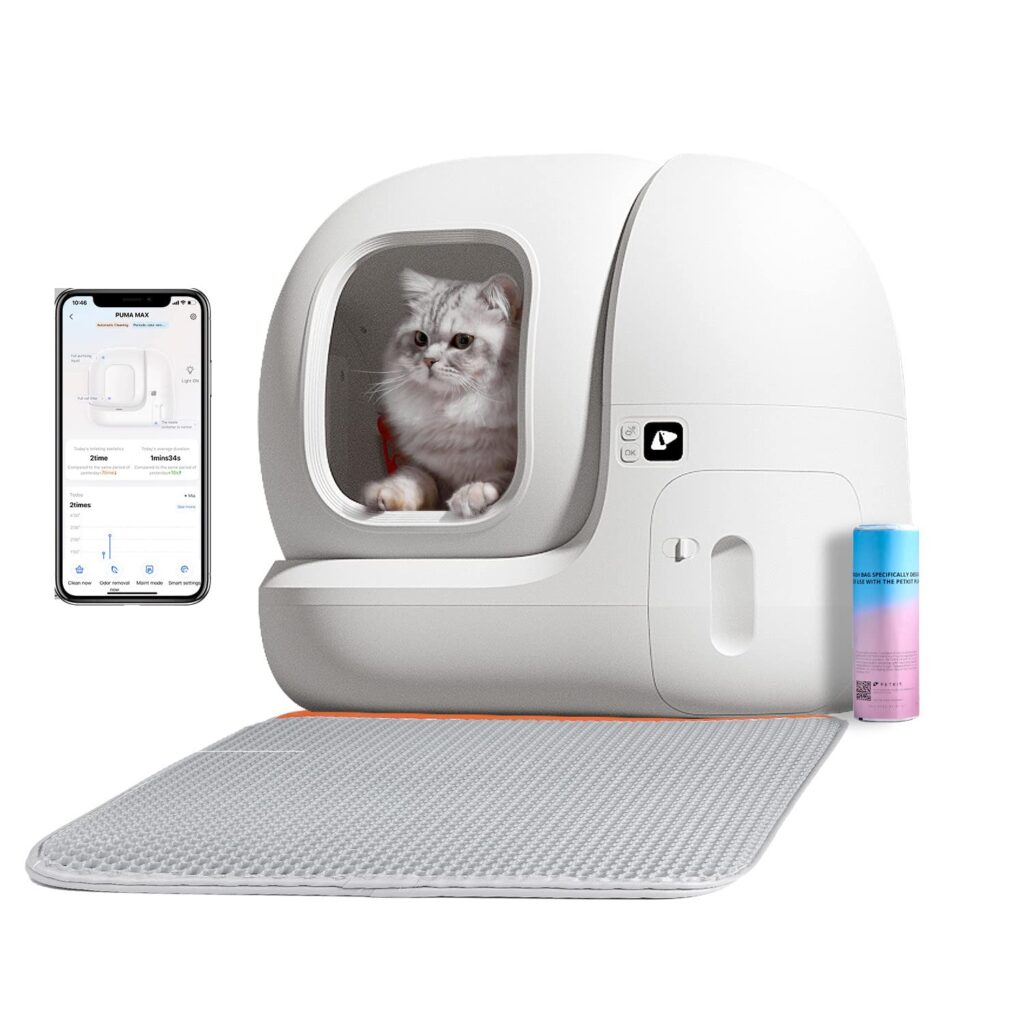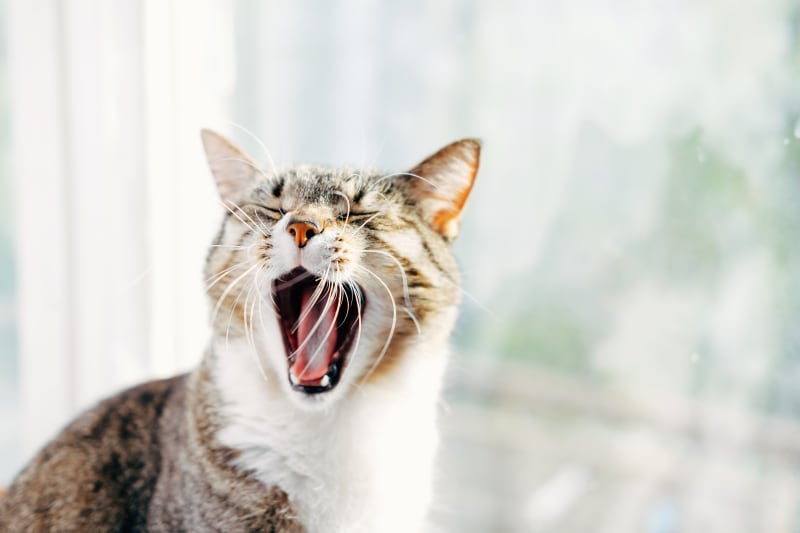Cats meow before throwing up to communicate distress or discomfort. This behavior is common among cats.
If you’ve ever been around cats, you may have noticed that they sometimes meow before throwing up. It’s not a pleasant sound or sight, but it’s important to understand why they do it. When it comes to cat behavior, their meowing is often a way of communicating distress or discomfort.
It’s their way of letting you know that something isn’t right, whether it’s an upset stomach or the beginning of an impending vomit. This behavior is quite common among cats and shouldn’t be ignored. We’ll explore the reasons behind this behavior and what you can do to help your cat when they exhibit this pre-vomiting meowing.

Credit: healthyspot.com
Contents
- 1 The Connection Between Meowing And Vomiting
- 2 Potential Causes For Meowing Prior To Vomiting
- 3 Medical And Health Factors
- 4 Behavioral Considerations
- 5 Dietary Factors
- 6 Potential Solutions And Preventive Measures
- 7 Supportive Care For Cats
- 8 Frequently Asked Questions For Cat Meowing Before Throwing Up: What’s Up With That?
- 9 Conclusion
The Connection Between Meowing And Vomiting
Understanding the link between vocalization and vomiting is crucial for cat owners. Cats often meow before throwing up, and while it may seem confusing, it serves as a communication tool. This behavior is rooted in their evolutionary instincts and can be attributed to several reasons.
One reason for excessive meowing is that cats use vocalization to seek attention or express discomfort. By meowing before throwing up, they are alerting their owners to their distress. It may also be a way of signaling that something is wrong or asking for help.
Another explanation for this behavior is that cats use meowing to warn other cats or humans in their territory. By vocalizing, they may be trying to communicate a message or create a safe distance to prevent any potential conflicts during their vulnerable state of vomiting.
Additionally, cats may meow before throwing up due to nausea or stomach discomfort. Meowing in this case may be their way of expressing unease or pain, seeking reassurance, or simply trying to gain attention for comfort.
As cat owners, it is important to pay attention to these behavioral cues. If your cat exhibits excessive meowing before vomiting, it is recommended to consult with a veterinarian to rule out any underlying health issues.
| Behavioral cues to look out for |
|---|
| Excessive meowing |
| Restlessness or pacing |
| Excessive grooming or licking |
| Loss of appetite |
| Changes in litter box usage |
By observing your cat’s behavior and understanding the connection between meowing and vomiting, you can provide the care and attention they need during these episodes.
Potential Causes For Meowing Prior To Vomiting
Understanding why your cat meows before vomiting can help you address any underlying issues. One possible explanation for this behavior is instinctual. Cats are natural hunters and solitary creatures, so meowing may serve as a communication tool to alert other animals or members of their social group.
Another factor to consider is the role of communication in feline vomiting. Cats may meow to signal distress or discomfort, which can be a sign of an impending vomiting episode. Stress, anxiety, or physical discomfort might trigger this behavior, and addressing these underlying issues can help reduce the frequency of meowing episodes.
Exploring the reasons behind meowing episodes is crucial for cat owners. Potential causes can include gastrointestinal issues, food sensitivities, hairballs, or even an underlying medical condition. Consulting with a veterinarian can help identify and address the root cause of your cat’s meowing and vomiting, ensuring their well-being and peace of mind.
Medical And Health Factors
It can be concerning when your cat starts meowing excessively before throwing up. While it may sometimes be a harmless behavior, it could also indicate underlying health issues. It’s essential to be aware of the medical and health factors that may contribute to this behavior.
Identifying underlying health issues in cats is crucial in understanding why they meow before vomiting. Some common medical conditions associated with meowing include gastrointestinal problems, such as gastrointestinal tract inflammation, foreign body obstruction, or intestinal parasites. Other possible causes could be kidney disease, urinary tract issues, or even dental problems.
If you notice your cat meowing excessively or find it difficult to ignore their behavior, it is advisable to seek veterinary help. A veterinarian will be able to conduct a thorough examination and perform any necessary diagnostic tests to identify the root cause of your cat’s meowing and vomiting. Early detection and appropriate treatment can help prevent further complications and ensure your cat’s well-being.
Behavioral Considerations
Cat Meowing Before Throwing Up: What’s Up With That?
Anxiety And Stress As Triggers For Meowing
Cats may meow before vomiting due to various behavioral considerations. Anxiety and stress can act as triggers for this behavior. Cats often vocalize to communicate their distress, and excessive meowing may be an indication of their discomfort. Environmental factors that contribute to vocalization can include changes in routine, introduction of new pets or people, or loud noises.
Reducing stress in your cat’s environment is crucial to minimizing stress-related vomiting. Providing a safe and quiet space, with access to resources like food, water, and litter box, can help alleviate anxiety. Regular play sessions and mental stimulation through interactive toys or puzzles can divert your cat’s attention and reduce stress. Using pheromone diffusers or calming sprays may also aid in creating a peaceful atmosphere.
Dietary Factors
Analyzing the impact of diet on meowing behavior
Food allergies and intolerances in cats can contribute to excessive meowing before throwing up. Some cats may be allergic to specific ingredients in their food, such as dairy, wheat, or certain protein sources. These allergies can cause gastrointestinal upset, leading to vomiting. Similarly, food intolerances can also trigger meowing and vomiting. Cats with sensitive stomachs may have difficulty digesting certain ingredients, resulting in discomfort and the need to expel the contents of their stomach.
Providing your cat with nutritionally balanced meals is crucial in reducing meowing before throwing up. A diet that meets all of their nutritional needs can help support their overall health and digestive system. Balanced meals should include high-quality sources of protein, essential fatty acids, vitamins, and minerals. Avoiding foods with artificial additives and fillers can also promote better digestion and reduce the likelihood of food allergies or intolerances.
Potential Solutions And Preventive Measures
To address medical concerns related to cat meowing before throwing up, it is crucial to consult with a veterinarian who can prescribe suitable treatments. Vet-prescribed medications and dietary modifications can help alleviate any underlying health issues that may be causing this behavior.
Another approach is to implement behavior modification techniques to reduce excessive meowing. This includes positive reinforcement training, environmental enrichment, and providing mental stimulation. Teaching your cat alternative behaviors or redirecting their attention can be helpful in curbing excessive meowing.
In addition to addressing medical concerns and behavior modification, creating a vomit-friendly environment can reduce the likelihood of your cat meowing before throwing up. This involves strategically placing litter boxes in multiple locations, ensuring access to fresh water, and providing a calm and stress-free atmosphere.
Supportive Care For Cats
Supportive care is crucial for cats experiencing vomiting episodes. Recognizing signs of distress during these episodes is important to ensure timely intervention. Common signs include excessive meowing, pacing, restlessness, and drooling. It is essential to provide comfort and reassurance to your cat during these moments of discomfort.
Here are some tips to help provide comfort to your cat:
- Quietly talk to your cat using soothing and comforting tones.
- Create a calm and stress-free environment by minimizing noise and distractions.
- Offer a safe and familiar space for your cat to rest.
- Stay close by to offer physical reassurance through gentle strokes or presence.
Additionally, ensuring proper hydration and nutrition during the recovery period is essential. Make sure your cat has access to fresh water and offer small, easily digestible meals as recommended by your veterinarian.
Frequently Asked Questions For Cat Meowing Before Throwing Up: What’s Up With That?
Why Is My Cat Meowing Weird And Throwing Up?
If your cat is meowing strangely and throwing up, it could be a sign of various health issues. It’s important to consult a veterinarian to determine the cause and provide appropriate treatment.
Why Does My Cat Cry Before Throwing Up?
Cats cry before throwing up because it’s their way of alerting you to their discomfort or sickness.
What Do Cats Do Before They Vomit?
Cats usually engage in behaviors like retching, drooling, and pacing before they vomit.
What Does A Cat Sound Like Before Throwing Up?
A cat before throwing up may make gagging or retching sounds. It is usually loud and repetitive.
Conclusion
The reasons behind your cat meowing before throwing up can vary, but it’s important to pay attention to this behavior. Causes include anxiety, hairballs, sensitivity to certain foods, or even an underlying health issue. By monitoring their diet, reducing stress, and seeking veterinary advice when necessary, you can help prevent excessive meowing and minimize discomfort for your furry friend.
Stay attentive and give your cat the care it deserves.

Katie Lindsey is a passionate cat lover and founder of Cats Solution, a comprehensive resource for all things feline. With a lifelong love for cats and extensive knowledge in their care and behavior, she provides expert advice and solutions to cat owners. Through her website, Katie fosters a supportive community where cat enthusiasts can find guidance and heartwarming stories. A dedicated advocate for animal welfare, Katie also promotes responsible pet ownership and adoption. Join her on this purr-fect journey celebrating the joy of feline companionship.



